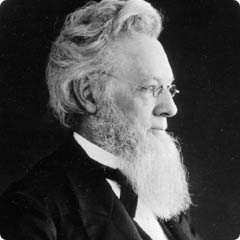|
"It is earnestly to be hoped that no single and earnest seeker after knowledge, of whatever age, sex, or previous condition, shall be denied the privilege of coming here."
Frederick A. P. Barnard (1809–1889)
Educator
University President 1864–89
The first career academic to assume Columbia's presidency, Barnard did more than anyone else to transform the College into a university. Neither a member of the New York Knickerbocker aristocracy nor a Columbia alumnus, he was a true outsider: a New Englander who graduated from Yale and taught mathematics and astronomy there and at the Universities of Alabama and Mississippi for a quarter-century before assuming the Columbia presidency in 1864. When he took the helm, he inherited a student body of 150 young men and a faculty of six. By the time he died 25 years later, he had achieved his stated goal of making Columbia "the most important institution in the most important state in the most important city." Under his leadership, the School of Architecture, the Faculty of Political Science and the School of Library Economy were established. He integrated elective courses into the structured curriculum and recruited students from outside the New York metropolitan area. The student body increased to 1,500 and the faculty to almost 100.
|

